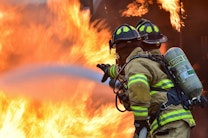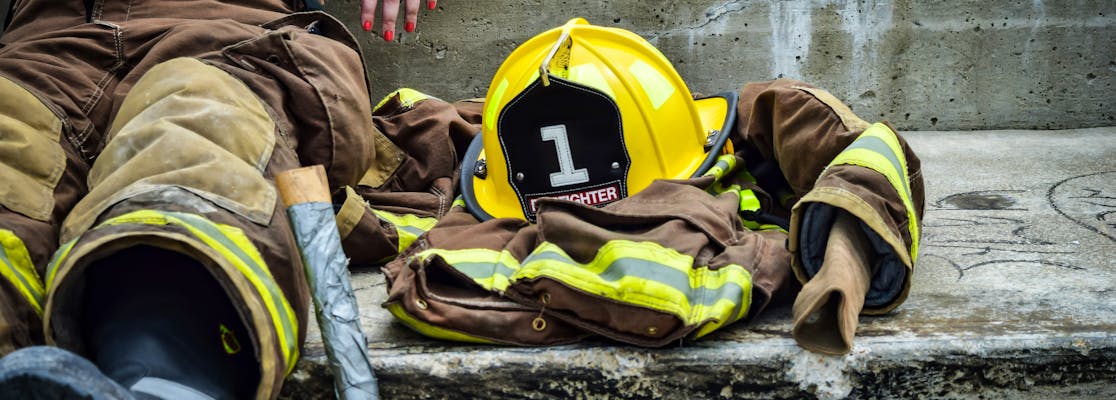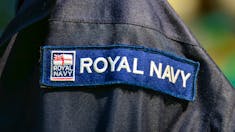Firefighter Situational Judgement Tests in 2026
All products and services featured are independently selected by WikiJob. When you register or purchase through links on this page, we may earn a commission.
- What Is Being Assessed On The Firefighter Test?
- Firefighter Test - Question Formats
empty
empty
empty
- What to Expect When Taking the Firefighter Situational Judgement Test in 2026
- How Are Firefighter Situational Judgement Tests Scored?
- Tips for Success on the Firefighter Test (2026)
- Frequently Asked Questions
- Final Thoughts
To become a firefighter, there are many steps that must be completed in the application process to ensure that you are a good fit for the role.
Part of the process will include psychometric tests, like numerical and verbal reasoning], personality assessments and situational judgement tests.
The aim of these is to get an objective view of an applicant’s skills, personality and behaviors – without any prior knowledge needed.
Situational judgement tests are usually based around a scenario, where the applicant is tasked with deciding on the most appropriate response.
You might have to rank the responses from most to least effective, choose the most and least effective, or simply pick the best option.
The method of answering will depend on the test publisher used, but they all follow the same basic structure.
What Is Being Assessed On The Firefighter Test?
To be a successful firefighter, you need to make quick decisions – often with limited information and under pressure. These decisions can be the difference between a positive and negative outcome and can even be lifesaving.
For firefighters, training to make these decisions is not always simple and straightforward; it is not necessarily a skill that can be learned. This is why firefighter psychometric testing, and particularly the situational judgement test, is an important part of the application process.
Situational judgement tests require you to make the right call under pressure with limited information – creating a virtual situation that needs to be dealt with in the most appropriate and effective way.
In the firefighter situational judgement test, in particular, the scenarios are based on real-world problems and issues that might arise in the day-to-day operations in a fire department – from problems with colleagues to dealing with the public.
By asking these job-relevant questions, the recruiters can assess whether you have the right attitudes, strengths and behaviors to be a successful fit for the fire department.
Firefighter Test - Question Formats
The actual format of the firefighter situational judgement test you will take as part of your application will depend on the test publisher, but they all have the same basic layout – a scenario based on real-world fire department issues, with a multiple-choice answer.
First Question Type
The first type of question provides a scenario and several options. You will need to select the most appropriate response from those listed.
For example,
There is a fire alarm in a building, and this is your third call to the same location just this evening. On first assessment, there doesn’t seem to be any cause for the alarm to be sounding and no obvious fault with the system. You consider that this might be malicious, but it needs further investigation.
The residential building has been evacuated, but on searching the area, there is a person refusing to leave, stating that there isn’t a fire, it is cold outside and it is the middle of the night.
Select the most appropriate action from this list:
A) Tell the person that there is a fire this time so that they will evacuate
B) Agree with them that there is no fire so they might as well stay where they are
C) Firmly encourage them to leave the building for their safety
D) Report on the radio and wait for further instructions
Practice Firefighter SJT Test with JobTestPrep

Second Question Type
For the second type of question, you might be asked to rank the options from most to least effective.
For example,
Your team is in the station between calls and there is some ‘banter’ amongst your colleagues. Some of this involves sexist comments, and it appears that everyone is finding it funny.
What should you do about it?
Rank these responses in order, from most effective to least effective:
A) Make a formal report about the behavior to your immediate supervisor
B) Join in with the banter so you seem like part of the team
C) Tell the crew to stop being sexist because it isn’t funny
D) Take the main culprit aside and tell them that it is inappropriate
E) Inform the supervisor that there needs to be some more training about discrimination
Third Question Type
The last format that you might have is to select both the most and least effective options from a range of responses.
For example,
You are at a serious road collision and there are multiple vehicles and casualties involved. Medical staff and police are on scene and you are working on making a smoking vehicle safe when a member of the public approaches you about a family member trapped in a vehicle. They want you to cut the family member out because they are in serious pain and unable to get themselves clear of the vehicle.
Select the most appropriate and least appropriate responses from the options below:
A) Leave what you are doing immediately and help the trapped person
B) Ask for assistance on the radio from other crews
C) Tell the member of the public to go away as you are busy
D) Ask the member of the public to be patient as the situation is being dealt with in order of severity
If you need to prepare for a number of different employment tests and want to outsmart the competition, choose a Premium Membership from JobTestPrep.
You will get access to three PrepPacks of your choice, from a database that covers all the major test providers and employers and tailored profession packs.
Don’t spend too long on each question as these tests tend to be timed, so answering as many questions as possible within the time limit is important.
Situational judgement tests add time pressure to your decision-making so that you are forced to make a judgement quickly (like you would in a real-life firefighting situation).
What to Expect When Taking the Firefighter Situational Judgement Test in 2026
The firefighter situational judgement test is meant to be challenging, but not impossible. You can expect to be asked a few questions that relate to the general duties of a firefighter, but you do not need to have any particular knowledge or experience.
In some cases, the tests are administered online through a link that you will be sent by the recruiter. These tests are timed, with several questions that need to be answered.
The tests are usually around 30 minutes in length, with 20 or so questions. You can complete this at home in your own time.
You might be required to take the test on paper – in which case the same parameters will apply.
There may be an assessment center nearby. If so, you will be asked to complete one or more tests in a central location – full details will be supplied by the recruiter. The assessment center usually provides a range of computer-based tests, timed and laid out in the same way that you would complete them at home.
You do not need to bring anything with you, although you may be allowed to bring a pen and paper to make notes.
How Are Firefighter Situational Judgement Tests Scored?
As with other psychometric tests, situational judgement tests do not have an official pass/fail mark. Instead, the answers are compared to a baseline of the fire department’s requirements in terms of strengths, attitudes, skills and behaviors.
These are usually what are considered to be ‘soft skills’ – ones that can’t be taught.
Your score will be determined by how you answer, and there are no negative marks for ‘wrong’ answers – so to maximize your chance of success, you should aim to complete as many questions as you can in the allocated time.
Tips for Success on the Firefighter Test (2026)
Step 1. Practice
Although no previous knowledge or experience is needed for the firefighter situational judgement test, taking practice tests can help you become familiar with them.
If you can find out who the test publisher is before taking the tests, you can find scenarios based on their format and structure.
If not, then practicing on generic situational judgement tests will give you more confidence in quickly reading and understanding the scenario, as well as choosing the most appropriate responses.
Step 2. Learn What Behaviors Are Important
If you know what attitudes, strengths and behaviors are important as a firefighter, you will know what the situational judgement tests are looking for.
Your answers will demonstrate the way you deal with situations and what you think is important. If you can make this align with the requirements of the fire department, then you will score higher on the situational judgement test.
Step 3. Be Prepared
In the lead up to the situational judgement test, you must be well-rested, eat well and remain hydrated.
Whether you are taking the test in an assessment center, as part of a recruitment day or at home, you need to get into the right mindset so that you can perform at your best.
If you are at home, ensure that you have a quiet area with a steady, reliable internet connection so that you won’t be disturbed by family members or dropped Wi-Fi signal.
Although there are no specific pass/fail marks for the situational judgment test, you may find that your results fail to put you through to the next stage of the recruitment process. If your answers are not strong enough, you won't gain additional marks or scores.
There are two common reasons why a potential firefighter may fail the situational judgment test. First, they may overthink their answer or be completely unprepared to take the test.
The situational judgment test for firefighters will focus on your decision-making. Recruiters will want to know that you can make instant decisions under extreme pressure, with little to no available information to inform your decision.
In that respect, you do not need to use math. Most of the questions will be based on true-to-life scenarios. You will likely be given multiple choice answers to explain how you would respond to those scenarios.
However, although math isn't required for the situational judgment test, it is a core skill needed by firefighters to do their day jobs. You'll need to be able to manage constant calculations, often with arithmetic, while working under extreme pressures.
Various online resources will help you prepare for an upcoming Firefighter situational judgment test. We recommend the comprehensive resources available via JobTestPrep.
You can make the most of practice exams, but you can benefit from an in-depth explanation of why the right answers are chosen. There is also a detailed study guide to help you prepare in full.
Firefighter situational judgment tests are designed to ensure that you have the right personal qualities and attributes. Therefore, your responses to the test questions should demonstrate that you have the right qualities that recruiters are looking for in firefighters.
One of the best ways to prepare for the situational judgment test is to practice online test questions. This will help to familiarise the style of questioning and indicate your strengths and weaknesses. Participants who fail to pass their STJ do so because they either haven't prepared and didn't know what to expect, or they overthought their responses and confused the answers.
During your practice, you need to think carefully about what the example questions ask you to do. A failure to interpret the question correctly could cause you to select the wrong answer. Therefore, the more practice you do, the easier you will find the assessment when test day comes.
There are numerous study aids available to help you prepare for a firefighter situational judgment test. The most popular book available on Amazon is part of the 'How to become'… series.
The firefighter situational judgement tests (Testing Series) is an updated book, published in 2020, giving you the latest advice and information on passing an SJT.
The firefighter situational judgment tests have the balance between being tricky yet not difficult. They are designed to test candidates' behaviors and assess how they are likely to respond to different scenarios. But they are not designed to trip people up.
You don't need to have previous experience to complete a situational judgment test. Still, the more you can learn about the preferred attributes and qualities needed, the easier you will find the test questions.
You have to be at least 18 to apply for a job within the fire services. There are no upper age limits, as much will depend on the physical medical assessments. Someone in their 40s could be just as fit, strong, and capable as a candidate in their 20s.
Most of the questions asked on the test will be focused on real-life scenarios. Therefore, you should be well prepared for the type of work involved when working as a firefighter. This will help you to understand and visualize the test questions.
Think about how you would respond to emergency incidents, what interactions you may have with members of the public, how you would communicate with colleagues, and how you respond to management. The scenarios may be based around all of these areas, so the more you acquaint yourself with these scenarios, the easier you may find the test.
The easiest way to study is to practice online tests. However, you may find that some test questions have similar answers that aren't immediately apparent. Therefore, by familiarising yourself with the test question style, you can feel more confident in your answers.
If you have been unsuccessful in your first attempt at the situational judgment test, you can try again after three months.
Final Thoughts
Firefighters often need to make life-or-death decisions quickly and confidently. Having good situational judgement skills can be lifesaving – and when under pressure, firefighters must demonstrate their abilities to make the best decisions with limited information.
Although the firefighter situational judgement test is only a part of the overall application process, success here will demonstrate that you have what it takes to act confidently and efficiently in making decisions. Practice is important.
The firefighter situational judgement test may be administered in the early stages of the application process, or further in to assess suitability. Either way, practice and familiarity with the structure, layout and types of answers that the recruiter is looking for will help you to be successful.



